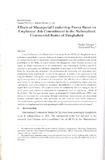| dc.contributor.author | Jahangir, Nadim | |
| dc.contributor.author | Haq, Mahmudul | |
| dc.date.accessioned | 2017-05-21T06:34:59Z | |
| dc.date.available | 2017-05-21T06:34:59Z | |
| dc.date.issued | 2005-03 | |
| dc.identifier.citation | Jahangir, N., & Haq, M. (2005). Effects of managerial leadership power bases on employees’ job commitment in the nationalised commercial banks of Bangladesh. Bank Parikrama, XXX(1), 22–42. | en_US |
| dc.identifier.issn | 10197044 | |
| dc.identifier.uri | http://hdl.handle.net/10361/8161 | |
| dc.description | This article was published in the Bank Parikrama (A Journal of Banking & Finance) [ @ 2005 Bank Parikrama. ] | en_US |
| dc.description.abstract | Lack of efficiency in the Nationalised Commercial Banks (NCBs) of Bangladesh can be
attributed to a multitude of sources. Absence of adequate infrastructure facilities, lack of modern
technology and the use of conventional managerial approaches have all contributed to the dismal
performance of the NCBs. In a poor country like Bangladesh, where financial resources are
scarce, an abrupt improvement in the infrastructure and technological facilities cannot be
expected in government-owned banks. Immediate improvement in the NCBs can be brought
about by improving the employees' job performance by motivating and developing their
commitment to the organisation. The role of the managers as leaders of the employees is vital
along this direction. Among the various aspects ofleadership the use of power bases has gained
significant popularity in the literature of management. The effective use of different bases of
social power by the managers can contribute significantly in accomplishing higher employee
commitment, greater job performance. and higher job satisfaction, all of which result in improved
organisational performance. This paper examines the relationship between managers' use of
social power and employees' organisational commitment level in context of NCBs of
Bangladesh. The five bases of social power, as developed by French and Raven (I 959), were
utilised to investigate the relationship. Bivariate correlation, factor analysis and hierarchical
multiple regression analyses were performed on data obtained from NCBs employees.
The results indicate significant relationship between organisational commitment and two bases of
social power. Implications for practicing managers and for future research are also discussed'. | |
| dc.language.iso | en | en_US |
| dc.publisher | © 2005 Bank Parikrama | en_US |
| dc.subject | Commercial bank | en_US |
| dc.subject | Leadership | en_US |
| dc.title | Effects of managerial leadership power bases on employees' job commitment in the nationalised commercial banks of Bangladesh | en_US |
| dc.type | Article | en_US |
| dc.description.version | Published | |
| dc.contributor.department | BRAC Business School, BRAC University | |

